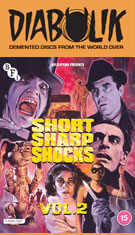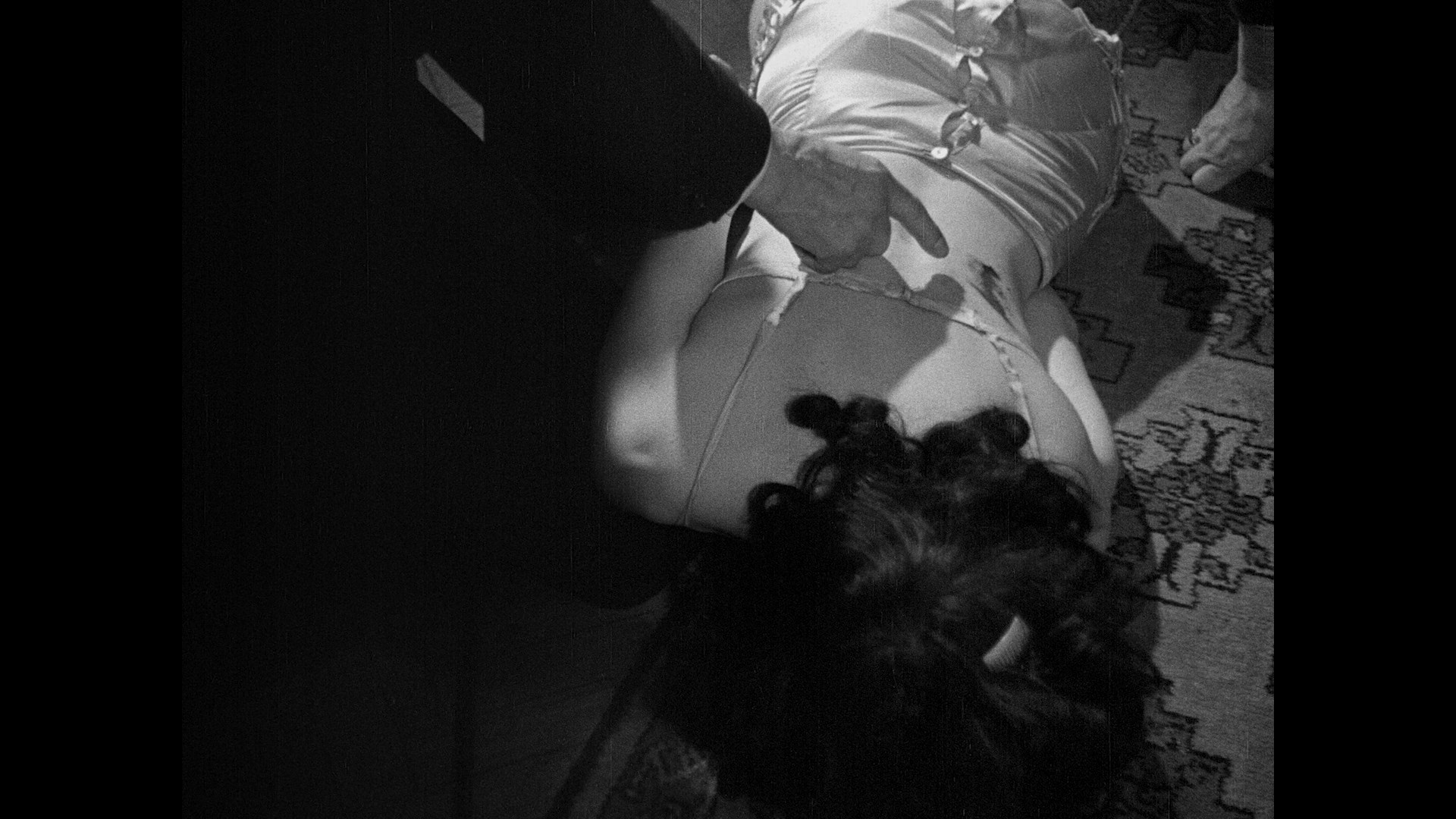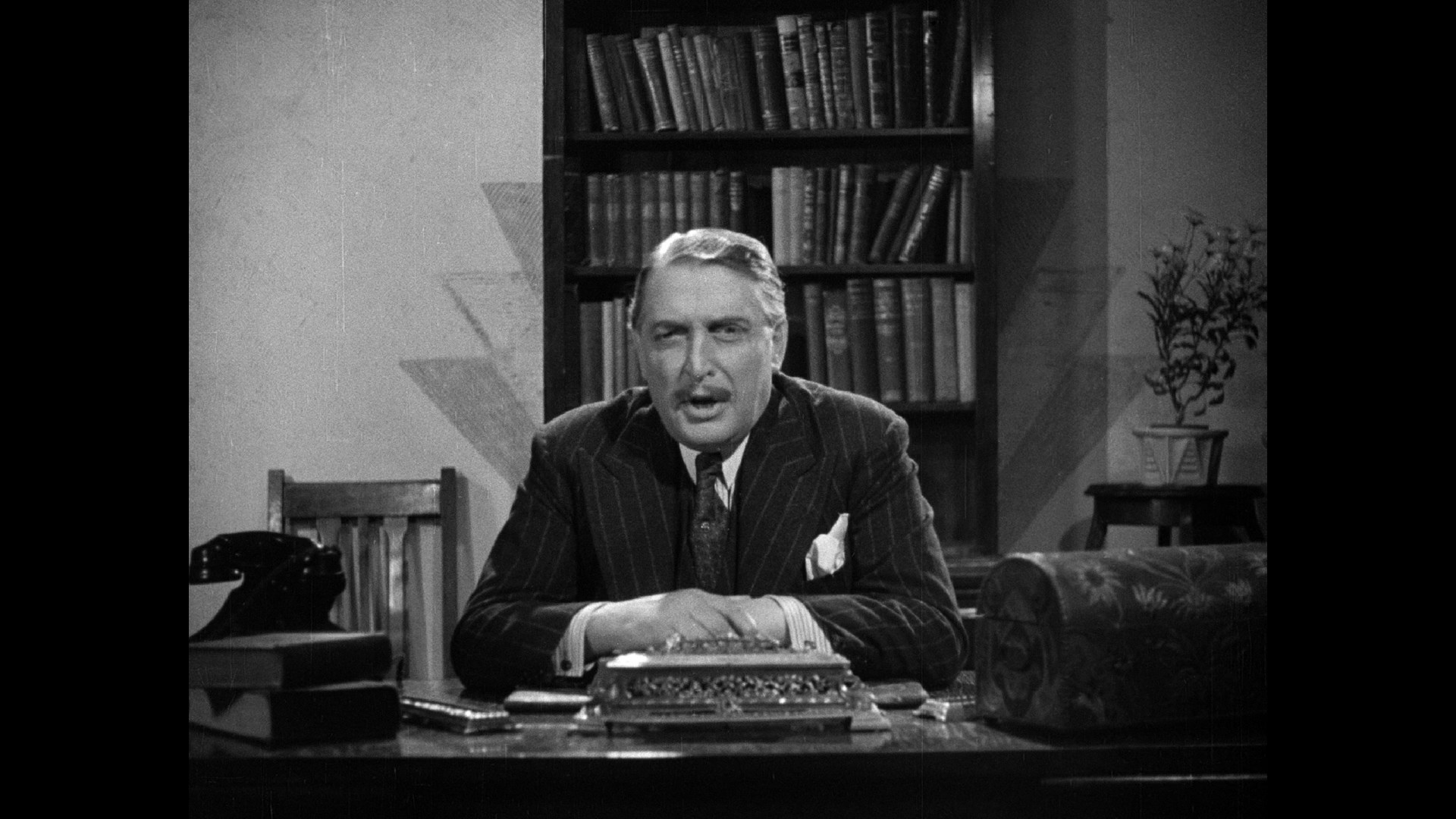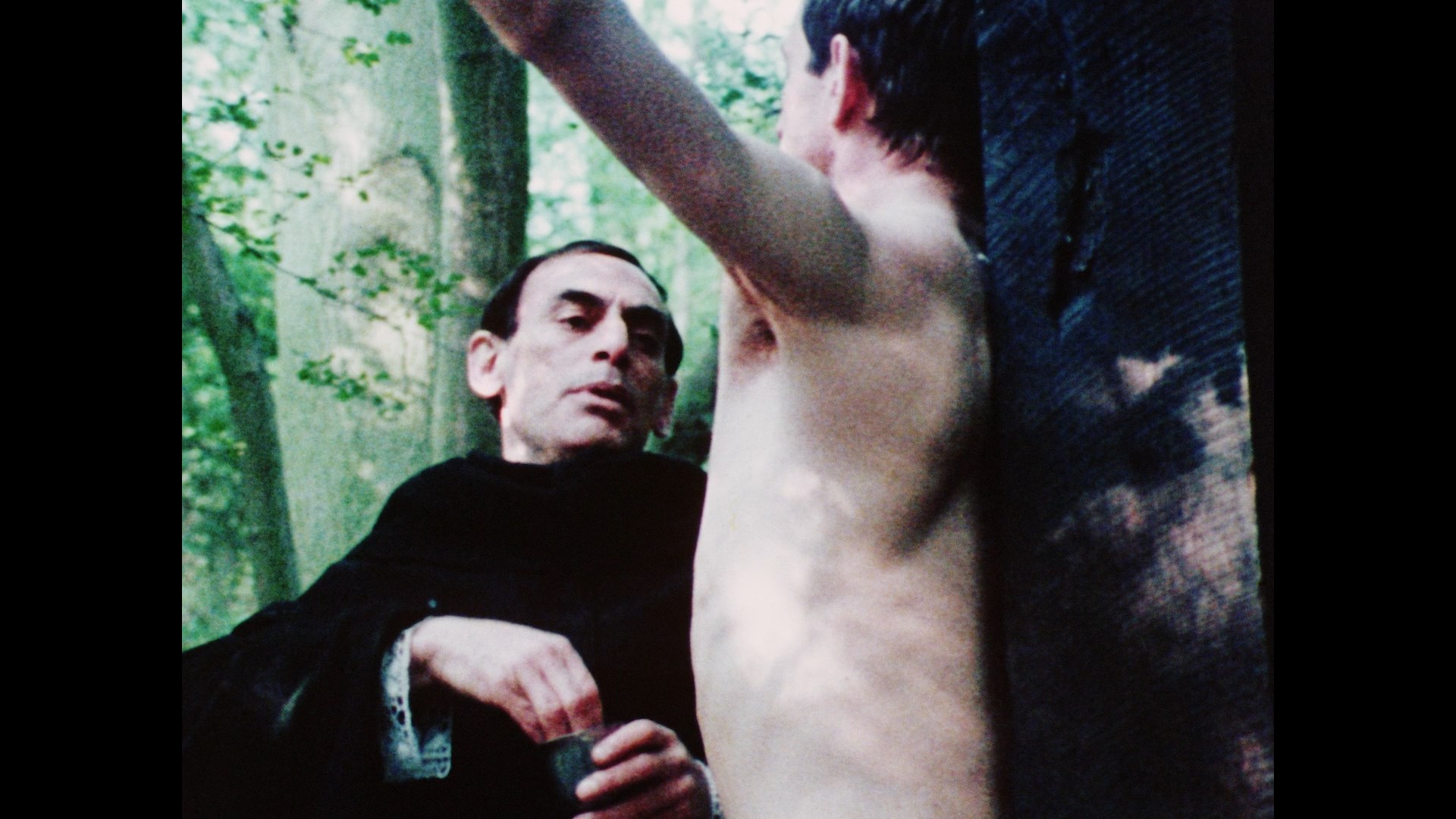



 to nightmare-inducing slashers, and everything in between. As with the previous set, your mileage will vary as these were made over four decades with a wide variety of styles and sensibilities, but the "what could possibly be coming
to nightmare-inducing slashers, and everything in between. As with the previous set, your mileage will vary as these were made over four decades with a wide variety of styles and sensibilities, but the "what could possibly be coming  up next?" aspect is also a huge part of these films' appeal.
up next?" aspect is also a huge part of these films' appeal. and "The Hairless Boarder," with a different, unnamed Inspector (Max Earl, who's a snappier dresser) narrating the stories of a boy seemingly snatched via ladder through a bedroom window and a jewel theft that leads to murder with a telltale bloodstain inside the case. The very short The Mystery Children (2m58s) is a quick and cool little warning following three cute tykes getting ready to go out into the neighborhood, but it turns out to be a very morbid and creepy plea for safety.
and "The Hairless Boarder," with a different, unnamed Inspector (Max Earl, who's a snappier dresser) narrating the stories of a boy seemingly snatched via ladder through a bedroom window and a jewel theft that leads to murder with a telltale bloodstain inside the case. The very short The Mystery Children (2m58s) is a quick and cool little warning following three cute tykes getting ready to go out into the neighborhood, but it turns out to be a very morbid and creepy plea for safety. (The Flesh and the Fiends, The Reptile, The Plague of the Zombies), who even provides a written forward touting this as the first of his series of "psychic mysteries." John Le Mesurier (Dad's Army) stars as Pendicot, a criminal who escapes from prison where he's serving a sentence for shooting a maid during a burglary. After some police procedural filler that might make you wonder why this is on the set, the fun stuff starts when he decides to return to the scene of the crime with a fellow criminal to raid the safe. Things get... a bit uncanny. 1958's Mingoloo from director "Zichy" (Theodore Zichy, who was behind the equally off-center "Death Was a Passenger" and "Portrait of a Matador" in volume one) is a really baffling entry starting off with artist Mark
(The Flesh and the Fiends, The Reptile, The Plague of the Zombies), who even provides a written forward touting this as the first of his series of "psychic mysteries." John Le Mesurier (Dad's Army) stars as Pendicot, a criminal who escapes from prison where he's serving a sentence for shooting a maid during a burglary. After some police procedural filler that might make you wonder why this is on the set, the fun stuff starts when he decides to return to the scene of the crime with a fellow criminal to raid the safe. Things get... a bit uncanny. 1958's Mingoloo from director "Zichy" (Theodore Zichy, who was behind the equally off-center "Death Was a Passenger" and "Portrait of a Matador" in volume one) is a really baffling entry starting off with artist Mark  (Anthony F. Page) dreaming of a strange-looking doggie type creature. He soon starts bringing the creature to life in his work, but it's such a stark change of pace from his normal style he initially considers letting his assistant, Linda (the astoundingly grating Therese Burton), be its creator. Trying to mass produce the pieces turns into a smuggling caper involving international espionage, with a Chinese gong used a musical accompaniment because... '50s. Probably the most intriguing thing here is the assistant director, Douglas Hickox, who went on to have a great directing run in the '70s with Theater of Blood, Sitting Target, Brannigan, Sky Riders, and Zulu Dawn. Finally disc one closes out on a short but absolutely insane note with 1961's "Jack the Ripper with Screaming-Lord Sutch" (2m42s), a Scopitones-style music video (for a line of video jukebox machines called Cinebox) with the Joe Meek-shepherded title singer vamping it up on a colorful sound stage stabbing ladies of evening.
(Anthony F. Page) dreaming of a strange-looking doggie type creature. He soon starts bringing the creature to life in his work, but it's such a stark change of pace from his normal style he initially considers letting his assistant, Linda (the astoundingly grating Therese Burton), be its creator. Trying to mass produce the pieces turns into a smuggling caper involving international espionage, with a Chinese gong used a musical accompaniment because... '50s. Probably the most intriguing thing here is the assistant director, Douglas Hickox, who went on to have a great directing run in the '70s with Theater of Blood, Sitting Target, Brannigan, Sky Riders, and Zulu Dawn. Finally disc one closes out on a short but absolutely insane note with 1961's "Jack the Ripper with Screaming-Lord Sutch" (2m42s), a Scopitones-style music video (for a line of video jukebox machines called Cinebox) with the Joe Meek-shepherded title singer vamping it up on a colorful sound stage stabbing ladies of evening. feature and ran as the long accompanying short in the U.K. with The House by the Lake (a.k.a. Death Weekend). Starting off with a juxtaposition between a covert ritual in the woods involving men in robes and on-the-street coverage of a hard-line extremist politician played by (the normally much funnier) Lennard Pearace, who's gone ice-cold after the reputed murder of his wife by Satanist terrorists(?). His current project: reviving an ancient occultist (David Allister) to
feature and ran as the long accompanying short in the U.K. with The House by the Lake (a.k.a. Death Weekend). Starting off with a juxtaposition between a covert ritual in the woods involving men in robes and on-the-street coverage of a hard-line extremist politician played by (the normally much funnier) Lennard Pearace, who's gone ice-cold after the reputed murder of his wife by Satanist terrorists(?). His current project: reviving an ancient occultist (David Allister) to  pull off a catastrophic public events that will get his bill passed. However, carrying out the explosive tragedy delivers an aftermath its architect hadn't imagined. Shot on 16mm, this one has a very Hammer House of Mystery & Suspense vibe to it and is a very ambitious film that gets about as far it can on a limited budget. The excellent acting does a good job of selling this Faustian tale that now feels more than a tad ahead of its time. Next up is the most widely-seen title in the set 1979's The Dumb Waiter (17m26s), which actually got some cable TV play on HBO as a time filler between movies in the early '80s. An early effort from director Robert Bierman (Vampire's Kiss), it's an icy little treat following a terrifying evening in the life of Sally (Geraldine James), who's informed by a stalker on the phone that he'll be watching and following her tonight. After a car ride turns into a near assault, she comes home to have a friend over only to find that her inner sanctum may be no protection at all. It's a very atmospheric and enjoyable little suspense piece with a strong slasher slant, even though there's nothing explicit; it also doesn't hurt that this is extremely well shot by Billy Williams (Women in Love) and marks the second credit for composer Colin Towns just after his remarkable debut with The Haunting of Julia.
pull off a catastrophic public events that will get his bill passed. However, carrying out the explosive tragedy delivers an aftermath its architect hadn't imagined. Shot on 16mm, this one has a very Hammer House of Mystery & Suspense vibe to it and is a very ambitious film that gets about as far it can on a limited budget. The excellent acting does a good job of selling this Faustian tale that now feels more than a tad ahead of its time. Next up is the most widely-seen title in the set 1979's The Dumb Waiter (17m26s), which actually got some cable TV play on HBO as a time filler between movies in the early '80s. An early effort from director Robert Bierman (Vampire's Kiss), it's an icy little treat following a terrifying evening in the life of Sally (Geraldine James), who's informed by a stalker on the phone that he'll be watching and following her tonight. After a car ride turns into a near assault, she comes home to have a friend over only to find that her inner sanctum may be no protection at all. It's a very atmospheric and enjoyable little suspense piece with a strong slasher slant, even though there's nothing explicit; it also doesn't hurt that this is extremely well shot by Billy Williams (Women in Love) and marks the second credit for composer Colin Towns just after his remarkable debut with The Haunting of Julia. pulverizing passersby below (including a little kid!), we meet our host, a beefy guy in a black mask and wife-beater, who presents four deadly scenarios in which we're challenged to spot all the danger signs. If you fail, he's playing a live game of hangman along the way that will lead to your doom. If you're a fan of carnage-packed educational films, this one's absolutely unmissable. Last up
pulverizing passersby below (including a little kid!), we meet our host, a beefy guy in a black mask and wife-beater, who presents four deadly scenarios in which we're challenged to spot all the danger signs. If you fail, he's playing a live game of hangman along the way that will lead to your doom. If you're a fan of carnage-packed educational films, this one's absolutely unmissable. Last up  is 1986's The Mark of Lilith (33m16s), an interesting precursor of sorts to the gritty arty urban vampire wave of the '90s (The Addiction, Nightowl, Nadja, etc.). Told in a jagged style, the film begins with lesbian college student Zena (Pamela Lofton) delivering an address about the progressive aspects of the horror genre while surrounded by attendees in creepy masks, as nearby some vampires, Lillia (Franklyn) and Luke (Jeremy Peters), argue in a club about their predatory and general lifestyle habits. Soon Lillia and Zena's paths cross, which results in a most unusual romance. A fascinating miniature contribution to discussion of vampirism's role in popular culture, it's an unpolished but memorable and sometimes spooky film with occasional echoes of Martin and Ganja and Hess. Plus, don't miss the mid-'80s street shots including a theater marquee showing Teen Wolf and D.A.R.Y.L.!
is 1986's The Mark of Lilith (33m16s), an interesting precursor of sorts to the gritty arty urban vampire wave of the '90s (The Addiction, Nightowl, Nadja, etc.). Told in a jagged style, the film begins with lesbian college student Zena (Pamela Lofton) delivering an address about the progressive aspects of the horror genre while surrounded by attendees in creepy masks, as nearby some vampires, Lillia (Franklyn) and Luke (Jeremy Peters), argue in a club about their predatory and general lifestyle habits. Soon Lillia and Zena's paths cross, which results in a most unusual romance. A fascinating miniature contribution to discussion of vampirism's role in popular culture, it's an unpolished but memorable and sometimes spooky film with occasional echoes of Martin and Ganja and Hess. Plus, don't miss the mid-'80s street shots including a theater marquee showing Teen Wolf and D.A.R.Y.L.! ![]()